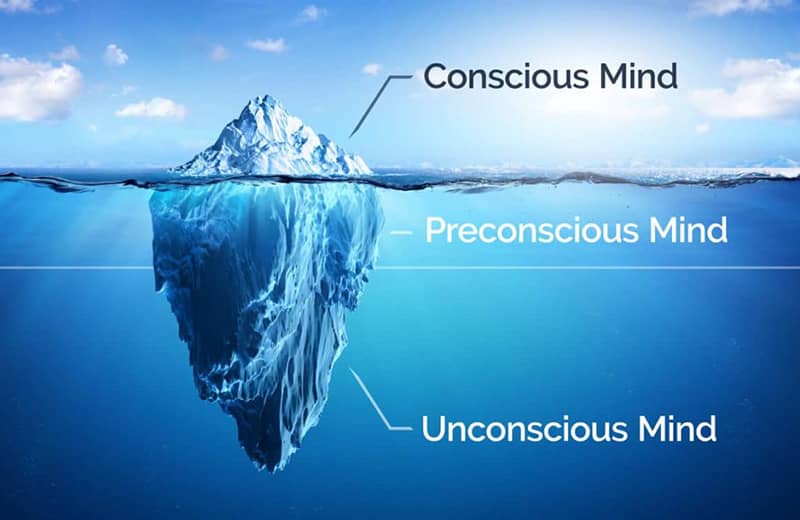Contents
Shedding Light on the Intricate Workings of Our Mental Realms
Prof. Aécio D’Silva, Ph.D
AquaUniversity
Conscious and Subconscious Minds – The human mind is a complex and intricate tapestry, woven with threads of consciousness and subconsciousness. These two aspects of our mental realm play distinct roles in shaping our thoughts, emotions, and actions. While both are integral to our cognitive functioning, they operate in fundamentally different ways. In this blog, we will delve into the depths of our minds to explore the intriguing disparity between the conscious and the subconscious.
The Conscious Mind: The Beacon of Awareness
At the forefront of our mental processes lies the conscious mind, often likened to a spotlight illuminating our thoughts and experiences. It encompasses our immediate awareness, enabling us to perceive and interact with the world around us. The conscious mind plays a vital role in decision-making, rational thinking, and logical reasoning. It is the driving force behind our voluntary actions and holds the key to our ability to deliberate, analyze, and comprehend.
When we are awake and alert, our conscious mind is fully active, processing information in real time. It enables us to engage in conversations, solve problems, and navigate through our daily lives. The conscious mind also grants us the ability to focus our attention on specific tasks or stimuli, filtering out distractions and homing in on what is relevant. However, its capacity is limited, and we can only consciously process a fraction of the vast amount of information available to us at any given moment.
The Subconscious Mind: The Silent Powerhouse
Beneath the surface of conscious awareness lies the subconscious mind, a reservoir of thoughts, memories, emotions, and instincts that shape our perceptions and behaviors. Operating beyond our immediate conscious attention, the subconscious mind is like an invisible force influencing our thoughts and actions. It serves as a repository for experiences, beliefs, and values, often driving our automatic responses and habits.
Unlike the conscious mind, the subconscious mind operates effortlessly and automatically. It processes information at an astounding speed, making it responsible for our intuition, creativity, and pattern recognition. Our long-term memories and learned skills are stored here, allowing us to perform tasks without actively thinking about them. The subconscious mind is also believed to have a powerful influence on our emotions, desires, and motivations, shaping our overall sense of self.
Interplay between Conscious Minds and Subconscious
Although distinct, conscious minds and subconscious minds are not mutually exclusive entities. Rather, they interact and influence each other in intricate ways. Our conscious thoughts and intentions can shape the content of the subconscious mind, while the subconscious mind can subtly influence our conscious experiences and decision-making processes. This interplay between the two realms showcases the remarkable complexity of our cognition.
Scientists and psychologists have long sought to unravel the mysteries of this interplay, delving into fields such as psychoanalysis, cognitive psychology, and neuroscience. Through various techniques like hypnosis, meditation, and dream analysis, they aim to tap into the subconscious realm, bringing it into conscious awareness for exploration and healing. This ongoing research continues to shed light on the relationship between these two dimensions of the mind, further deepening our understanding of human consciousness.
Conscious and subconscious minds: Differences
The conscious mind is the part of the mind that is aware, thinks, and communicates with the outside world and the inner self. The subconscious mind is part of the mind that is not fully aware but stores recent memories and is in contact with the unconscious mind, which holds all past experiences. The conscious mind is responsible for logic, reasoning, and deliberate actions, while the subconscious mind is responsible for emotions, characteristics, desires, and instinctive or automatic actions1.
The main difference between the two is that the conscious is what you are aware of at any given moment, while the subconscious is what’s going on beneath the surface. Your conscious mind is like the tip of an iceberg, while your subconscious mind is like the iceberg beneath the surface2.
Whereas the conscious mind is abstract in its thinking, the subconscious mind is very literal and requires us to be very specific in communicating with it. The subconscious mind is in the eternal present. Everything in the subconscious is NOW with no such thing as past or future3.
Your conscious mind is the thinking mind and accepts or rejects any information it’s presented. Your subconscious mind is the emotional mind and doesn’t have the ability to think or recognize what’s reality or fiction. For mindset transformation, both pieces of your mind must work in harmony4.

To conclude, in the intricate tapestry of our mind, the conscious minds and subconscious coexist, each playing its unique role in shaping our thoughts, emotions, and behaviors. While the conscious mind represents our immediate awareness and deliberate cognition, the subconscious mind holds our deeper memories, instincts, and eternal present.
References:
1Understand The Difference Between Conscious & Subconscious Mind
3What is the difference between conscious and subconscious mind in psychology?
2What Is The Difference Between Conscious And Subconscious?
4Conscious Mind Vs Subconscious Mind: What’s The Difference?



